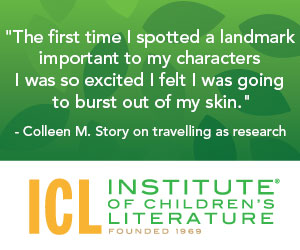1000 N. West Street #1200, Wilmington, DE 19801
© 2024 Direct Learning Systems, Inc. All rights reserved.

Because many of the books I write are created based on specs crafted by the publisher, I sometimes have to write about places I’ve never visited. This can make it difficult to create a believable world for my characters to live in. If I write a book set in Hawaii and have a character menaced by a venomous snake while chopping their way through a jungle, I’m going to get lots of comments from readers because Hawaii has no native venomous snakes.

When readers think of Stephen King, for instance, they think of Maine. Tony Hillerman’s mysteries will always be linked with New Mexico. Among children’s writers, Augusta Scattergood’s novels are very much songs of the South. By staying within specific regions or states, details like weather and terrain become almost automatic because the author is writing about home.
But for other writers, research is key to creating believable worlds for the characters. And that research sometimes takes the shape of visiting the place you’re writing about. Traveling for research can be rewarding or frustrating, but it’s almost always interesting.
Unfortunately, for most of us, travel is still not an option today. So how can we help make our worlds properly filled out with accurate information and sensory detail when we simply cannot go outside and experience things directly? One way is through solid research online. You can find maps and aerial views of places all over the world. You can find tourist photos and even videos. When I was working on my chapter book about the monster that some believe lives in Lake Tahoe, I found videos of dives made in the lake. As I watched the video, the diver talked about what the experience was like and that helped inform my book.

My husband is very fond of shows about building things: houses, barns, cabins. And there’s an interesting thing about builders. They inevitably talk about sensory detail on those shows. They’ll describe at length the smell of an old barn or an attic in a house. They’ll talk about the weather as they approach a new working day. They notice what goes on around them far more than I ever expected. I’m not interested in building, but I’m often taking notes when I hear the people on those shows sharing sensory detail.
Speaking of taking notes, I’ve suggested this before, but I cannot possibly over-recommend keeping a collection of sensory details from different locations, weather conditions and events. For years I kept this in an index card box (well, a collection of index card boxes). I know, I know, this is the computer age, but there is something I find very helpful about keeping little snippets of sensory detail on index cards. By doing so I can quickly tell you that poorly done compost smells like spoiled garbage and rotting eggs. I can also tell you that the unique earthy smell that comes just before the rain is called petrichor. The sharpness of the scent comes from the ozone while the earthy part is believed to be from spores. And if I’m writing about a carnival, I’ll draw from notes of sounds and smells taken from my own experience.
By keeping these kinds of details, I am ready whenever I decide to take my character off into the North Carolina woods where they may experience the dried leather feel of lichen and smell the sharp scent of wet leaves or the much muskier smell of a skunk who makes an impression even when unseen. I can take my characters places and build scenes that call to mind a variety of sounds, smells, and textures because I keep those things handy for just such a moment. I also collect unique turns of phrase I hear from people describing those very things. I’m always listening and always making notes. Then, when I cannot get outside to collect fresh data, I have someplace to turn to make the world of my story real.
It’s frustrating to have limited access to the world, but it doesn’t mean we have to shut down our senses when we write. There are still resources to help us experience the world around us and carry that experience to our readers. Who knows, by making us expand our ways of discovering the world, we might become better writers through all this after all. Here’s hoping.
With over 100 books in publication, Jan Fields writes both chapter books for children and mystery novels for adults. She’s also known for a variety of experiences teaching writing, from one session SCBWI events to lengthier Highlights Foundation workshops to these blog posts for the Institute of Children’s Literature. As a former ICL instructor, Jan enjoys equipping writers for success in whatever way she can.
1000 N. West Street #1200, Wilmington, DE 19801
© 2024 Direct Learning Systems, Inc. All rights reserved.
1000 N. West Street #1200, Wilmington, DE 19801
© 2024 Direct Learning Systems, Inc. All rights reserved.
1000 N. West Street #1200, Wilmington, DE 19801
© 2024 Direct Learning Systems, Inc. All rights reserved.
1000 N. West Street #1200, Wilmington, DE 19801
© 2024 Direct Learning Systems, Inc. All rights reserved.

1000 N. West Street #1200, Wilmington, DE 19801
© 2025 Direct Learning Systems, Inc. All rights reserved.

1000 N. West Street #1200, Wilmington, DE 19801
©2025 Direct Learning Systems, Inc. All rights reserved. Privacy Policy.
3 Comments